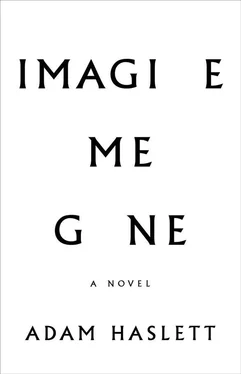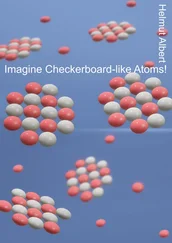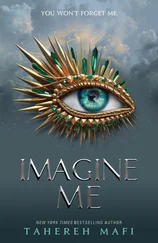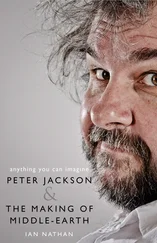To go and live with Simon and his family in a damp stone house back in Oxfordshire, just up the road from Fairford Air Base. I was given a spare bedroom overlooking a paved courtyard. The return to the States had put me behind on my A levels. On Saturdays, Simon and I went record shopping in Oxford, but otherwise we mostly slept, went to class, and studied. I found no pleasure in speed-reading Thackeray, but there you have it. I had to fly through those ballroom scenes on jet skis.
It wasn’t until spring that I went to get my hair cut in the village and met Angie. She worked in a little salon next to the greengrocer, just two chairs, a wall of mirrors, and a waiting bench, with a sink at the back and photos of soft-punk hair models in the window, like head shots for the Human League. The day I went she was the only stylist there. We had the place to ourselves. As soon as she put on Gloria Gaynor’s “I Will Survive” and began singing along with it, I knew we had things to discuss. That track may have started as a monster gay-club hit, but Angie sang it as though it were a personal anthem, nothing camp about it. She was beautiful. Right away. A slight, African-American woman between the hopelessly sophisticated ages of twenty-five and I don’t know what, with freckles under her eyes and across the bridge of her nose. She had three earrings in each lobe and a metallic blue bandanna wrapped around a cascade of Jheri curls. I asked question after question, and she answered them freely, her hands cupping my head, tilting it this way and that as she clipped. She’d grown up and gone to school in Cleveland. That’s where she’d met her husband, who was a jet mechanic at the air base. They’d been stationed in Turkey, then Germany, and now Fairford. This was the first place she’d been able to get a job of her own, which was a good thing too, she said, because her husband was in the habit of cheating on her with what she called “native women,” and she’d asked him for a divorce.
Was it the Sister Sledge / New Order mix tape that I brought her on my second visit that transformed me in her eyes from a client into a living subjectivity? Maybe. All I know is she didn’t complain about my returning every three or four days to get my bangs trimmed, with ever deeper and more challenging compilations in hand. She didn’t know Kraftwerk, or for that matter any German industrial music. It was when I suggested she give Einstürzende Neubauten a whirl that she said, “You’re cute.” That evening, Simon insisted she must have meant it in the diminutive sense, as you would speak to a child, not a prospective lover. But he hadn’t been there. He hadn’t seen her smile.
When I dropped another cassette off the next day, I enclosed a note asking if she would go on a date with me. I suggested we go to Oxford, imagining she might feel awkward being seen with me by the locals. I envisioned us holding hands on the night bus back to Carterton, perhaps with her head resting on my shoulder. I would absorb all her suffering, leaving her weightless, and free to love me. We had never touched, and yet she had already voided all of my worries but one: when I would see her next.
After forty-eight hours, she still hadn’t called. Desperate, I tried to make another appointment, but her colleague said she was booked up and couldn’t see me. That night, after the salon closed, I slipped another tape through the mail slot, this one starting with Joy Division’s “Love Will Tear Us Apart,” along with a note apologizing for being too forward, saying I understood she might need time, given that her divorce wasn’t final. It was three days later, on a Saturday evening, that Simon and I saw her at the pub. She was with one of the other girls from the salon. I could tell she was trying to ignore me. But after she’d had a few drinks she relented, nodding hello from their table in the corner. Simon told me that I was crazy, that she was an older woman, and still married. Simon had a girlfriend, and they seemed to like each other, but I could tell from hanging out with them that he didn’t feel for her what I felt for Angie. They enjoyed each other, but they were still individuals. Their love hadn’t obliterated the quotidian; it hadn’t rid them of their workaday selves. That’s what Angie and I were capable of. She and her friend didn’t protest when I dragged Simon over to sit with them. They made us buy them drinks. Angie was tipsy but not drunk, and she didn’t move her leg aside when I touched it lightly with mine (of such miracles, strung endlessly together, true happiness is made). We talked about the deathly boredom of the Cotswolds and how Simon and I were going to move to London. When the publican barked last call, her friend said she hadn’t realized how late it was, and had to dash. Simon wisely did the same. Which left the two of us. She was taking the bus back to the base, she said. I asked if she would let me walk her to her stop. The thin fluorescent light that filtered through the scratched plastic siding of the bus shelter wasn’t strong enough to reveal her expression as we stood there watching the drizzle wet the pavement. And so it was with extreme trepidation, braced for rebuff, that I put a hand on her shoulder and leaned down to kiss her gently on the lips. But she closed her eyes and let it happen. After a moment she even put her hand to my arm, giving me the passing sense that I had a physical body.
Whatever psychic bandwidth I had for A levels vanished. I could think only of our future. I had curated my mix tapes for her with great care, but now they took whole afternoons. I needed to keep impressing her with my taste but demonstrate at the same time how much emotional experience we already shared. Those tapes were the line of flight out of the trap of language. Through the incision of music we could know and love each other much, much faster.
Each time I went by the salon to give her my latest cassette, she would thank me, take it quickly, and tell me she had a customer and couldn’t chat. I’d go every evening to the pub, risking the ire of Simon’s parents, and stay until closing, power-reading The Mill on the Floss by fake candlelight, waiting for her to appear. And on the nights that she did, she and her friend would sit with me again, kidding me about my exams, drinking more than I ever could, and Angie would let me walk her to the bus stop, and if no one was around, I got to kiss her, and sometimes hug her, too.
And yet to my consternation, she refused to let me take her on a full-on date. She kept using her husband as an excuse. But contained in each refusal, by the implication of her tone, was the one acknowledgment that counted: sooner or later we would see each other again.
I don’t know what most people mean when they use the word love . If they haven’t contorted their lives around a hope sharp enough to bleed them empty, then I think they’re just kidding. A hope that undoes what tiny pride you have, and makes you thankful for the undoing, so long as it promises another hour with the person who is now the world. Maybe people mean attractiveness, or affection, or pleasantness, or security. Like the nonbelievers in church who enjoy the hymns or go for the sense of community, but avert their eyes from the cross. I feel sorry for them. They are dead before their time.
As it happened, I didn’t do so well on my exams. Angie’s husband attempted to reconcile with her the week they started. I pleaded with her to go with me on the bus to Oxford, just for a single afternoon, and finally she relented. The day before my Modern History A level, I took her to the Debenhams on Magdalen Street. I had seen a fitted silk shirt in a catalog that Simon’s sister got in the mail, and I wanted to buy it for her, but she was crying intermittently and didn’t want any gifts. If you go back to your husband, nothing will change, I told her. He’ll keep you close for a while, and then cheat again. He wants to retain you for your physical beauty, but anyone can appreciate that. We’re on the threshold of something much greater. I may have confused her when I said our worlds could end as soon as we joined, but I meant only our life-worlds as separate subjectivities, not a material end. She told me I read too many novels, and led us out of Women’s Tops back onto the sidewalk.
Читать дальше












